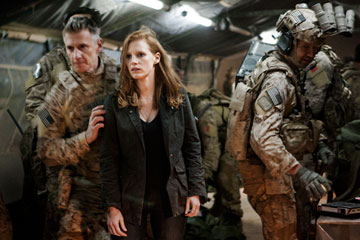
War is a man’s game traditionally, and so is moviemaking. But with the Iraq-occupation film The Hurt Locker, Kathryn Bigelow earned her stripes, becoming the first woman to win an Academy Award for Best Director; the film itself won Best Picture. In the riveting new true-life detective story Zero Dark Thirty, Bigelow goes bigger and bolder. She and her Hurt Locker writing partner, Mark Boal, argue that the U.S. battle against al-Qaeda was essentially won by a woman–a CIA analyst named Maya (Jessica Chastain) who spent eight years tracking down the hideout of Osama bin Laden.
The making of ZDT (in limited release Dec. 19) was an operation nearly as complex and secretive as the one that took down the al-Qaeda leader: If the movie was all about the May 1, 2011, SEAL Team 6 raid that killed bin Laden, as the early trailers hinted, then why did a woman have the leading role? (The raid, thrillingly portrayed, consumes just the final fifth of the movie.) The clandestine nature of the enterprise also stoked sepulchral suspicions that the film would be a mash note to Barack Obama. In August 2011, before ZDT had started shooting, New York Times columnist Maureen Dowd asserted that “the White House had outsourced the job of manning up the President’s image to Hollywood.” Peter King, the Republican who chairs the House Committee on Homeland Security, promised an investigation into any aid the Obama Administration might have afforded the film.
For the record, Bigelow received no help–no lending of aircraft or weaponry–from the U.S. military. Further, ZDT is not an overtly political film; it carries neither a torch for Obama (who is seen only for seconds, in a 2008 news clip, promising that his Administration will not engage in torture) nor the agitprop imprint of an Oliver Stone film. It does take the view that the U.S. government tries to do its best under punishing geopolitical circumstances. Like Argo–which, with all due respect to the Ben Affleck hit, ZDT blows out of the water–it portrays a real-life international adventure with a CIA agent as the hero. This time, a heroine.
In an agency staffed by enforcers like Dan (Jason Clarke), who is shown waterboarding one pitiful terrorist suspect, and upper-management toughies like George (Mark Strong), who barks at his field officers, “I want targets! Give me people to kill,” Maya at first seems as pale and vulnerable as a naked mole rat. But in her war-zone years, she develops the copper calluses and steely reserve of two fictional government operatives who chase brilliant madmen: Jodie Foster’s Clarice Starling in The Silence of the Lambs and Claire Danes’ Carrie Mathison on Homeland. After one of her closest colleagues is blown to bits in the 2009 suicide bombing at Camp Chapman that killed seven agents, Maya (based on a real CIA tracker) blooms into a state of obsessive ferocity. “I’m gonna smoke everybody involved in this op,” she says of that attack. “And then I’m gonna kill bin Laden.”
In The Hurt Locker, Bigelow and Boal viewed the war on terrorism in microcosm, through the eyes of a trio of bomb defusers in Iraq. ZDT is the macrocosm. Instead of a Baghdad street where an IED could explode underfoot, Maya and her colleagues tread a minefield that stretches from Kabul to Times Square. Though focusing on Maya, the film is a giant fresco, an imposingly crafted, fast-paced series of surgical strikes set in Pakistan, Afghanistan, Saudi Arabia, Kuwait, Poland and the U.S. For a throbbing two hours and 40 minutes, ZDT moves through enemy territory with the speed, weight, brains and grace of an All-Pro linebacker; it’s the Lawrence Taylor of war-ops movies.
At the end, eight years to the day after George W. Bush prematurely proclaimed it, an American official has earned the right to say “Mission accomplished.” So too, with this splendid sortie into cinematic reportage, has Bigelow.
More Must-Reads from TIME
- Why Biden Dropped Out
- Ukraine’s Plan to Survive Trump
- The Rise of a New Kind of Parenting Guru
- The Chaos and Commotion of the RNC in Photos
- Why We All Have a Stake in Twisters’ Success
- 8 Eating Habits That Actually Improve Your Sleep
- Welcome to the Noah Lyles Olympics
- Get Our Paris Olympics Newsletter in Your Inbox
Contact us at letters@time.com